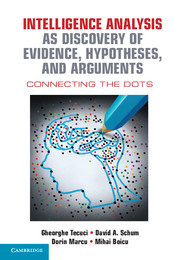Crossref Citations
This Book has been
cited by the following publications. This list is generated based on data provided by Crossref.
Tecuci, Gheorghe
Kaiser, Louis
Marcu, Dorin
Uttamsingh, Chirag
and
Boicu, Mihai
2018.
Evidence-Based Reasoning in Intelligence Analysis: Structured Methodology and System.
Computing in Science & Engineering,
Vol. 20,
Issue. 6,
p.
9.
van Gelder, Tim
De Rozario, Richard
and
Sinnott, Richard O.
2018.
SWARM: Cultivating Evidence-Based Reasoning.
Computing in Science & Engineering,
Vol. 20,
Issue. 6,
p.
22.
Tecuci, Gheorghe
2018.
Evidence-Based Reasoning and Applications.
Computing in Science & Engineering,
Vol. 20,
Issue. 6,
p.
6.
Tecuci, Gheorghe
Marcu, Dorin
Meckl, Steven
and
Boicu, Mihai
2018.
Evidence-Based Detection of Advanced Persistent Threats.
Computing in Science & Engineering,
Vol. 20,
Issue. 6,
p.
54.
Meckl, Steven
Tecuci, Gheorghe
Marcu, Dorin
and
Boicu, Mihai
2021.
Adversary-Aware Learning Techniques and Trends in Cybersecurity.
p.
125.
Kis, Alexandru
Tvaruška, Peter
and
Tarcala, Oliver
2021.
The Competing Hypotheses Analytical Model and Human Intelligence Single-Source Analysis.
International conference KNOWLEDGE-BASED ORGANIZATION,
Vol. 27,
Issue. 1,
p.
62.
Sunde, Nina
2022.
Unpacking the evidence elasticity of digital traces.
Cogent Social Sciences,
Vol. 8,
Issue. 1,
Twining, William
2022.
Evidential Legal Reasoning.
p.
13.
Tucker, Aviezer
2024.
From unreliable sources: Bayesian critique and normative modelling of HUMINT inferences.
Journal of Policing, Intelligence and Counter Terrorism,
Vol. 19,
Issue. 2,
p.
207.
Ross, John Wayne
2024.
Assumptions in intelligence analysis.
Intelligence and National Security,
p.
1.



